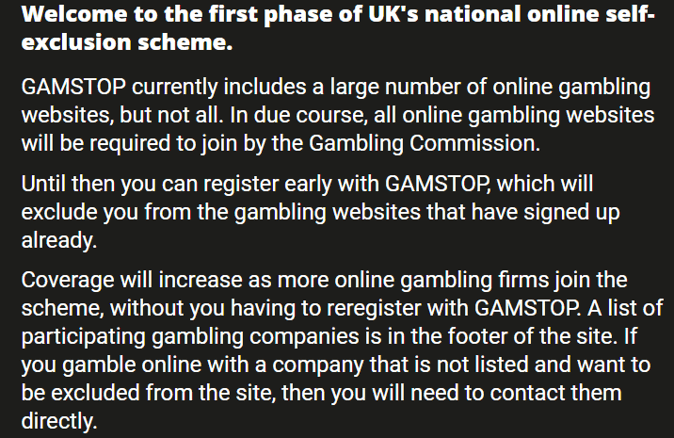GamStop Online Self-Exclusion System Has Flaws – Pressure Mounts For Change
 GamStop is a system that was launched in April of 2018 with the specific aim of allowing those with a gambling problem to stop themselves from being able to bet using online platforms and methods.
GamStop is a system that was launched in April of 2018 with the specific aim of allowing those with a gambling problem to stop themselves from being able to bet using online platforms and methods.
Since it launched more than 50,000 signed up to the service, hoping to use it as a method of limiting the amount of money that they could bet online, with online service and mobile apps being significantly easier to access than betting shops as you don’t need to leave your home to do it.
However, an investigation by the BBC found that gamblers could still place bets using websites and the like simply by inputting different user details than those that they had registered with GamStop.
The Chief Executive of the service, Fiona Palmer, confessed to the broadcaster that the system wasn’t working ‘well enough’, whilst the Gambling Commission said that they were hoping to bring in tougher ID checks to stop people simply being able to use different details in order to login to online betting accounts.
How GamStop Works

The idea behind GamStop is that it allows customers to restrict their own activity online for a chosen period of time. It only works with companies that are registered in the United Kingdom that have signed up and for consumers that are located in the same area.
It is hoped that it will become necessary for companies to sign up to the scheme in the future as part of their licensing agreement, though that is yet to be the case.
In order to register you have to provide GamStop with your date of birth, your postcode and your email address, amongst other details. These are necessary in order for GamStop to be able to confirm your identity as well as to stop you being able to register with online companies.
It is the latter thing that has caused controversy, with an investigation by BBC Radio 5 live discovering that users could register a new account by doing things as simple as misspelling their surname.
Once you have registered with GamStop you will be able to choose whether to exclude yourself from online gambling for a period of 6 months, 1 year or 5 years. You will then be unable to cancel that self-administered exclusion until the period you have selected has run its course.
Indeed, even when the exclusion period is over you will not be able to join gambling websites unless you return to GamStop and inform of them of your wish to end your voluntary exclusion.
Gamblers Find The Ability To Register With A Different Email Address ‘Scandalous’
 David Bradford was jailed for fraud in 2014 after stealing £50,000 from a former employer in order to fund his gambling addiction. That was the first point at which his son, Adam, discovered he had a problem, in spite of the fact that he had lost more than £100,000 through gambling online.
David Bradford was jailed for fraud in 2014 after stealing £50,000 from a former employer in order to fund his gambling addiction. That was the first point at which his son, Adam, discovered he had a problem, in spite of the fact that he had lost more than £100,000 through gambling online.
Adam Bradford has since become a campaigner who wants to raise awareness about the inherent risks of gambling online, including the fact that GamStop’s system of self-exclusion is deeply flawed.
Mr Bradford registered himself with GamStop as part of the aforementioned BBC 5 live investigation but showed the broadcaster that it was easy enough to open a new account even after doing so.
By using a new email address, which can be obtained for free from companies such as Google and Microsoft, and misspelling his surname, he was not only allowed to open a new online betting account but was even offered £50 in free bets. Speaking to the BBC he said, “I think it’s scandalous…The industry is putting up what I think is a facade. It doesn’t work”.
It’s Not Just The GamStop System That Is Flawed
 It is worth noting that it is not just the GamStop system for online betting that does not work as it’s supposed to. There’s a system called MOSES, which stands for the Multi-Operator Self Exclusion Scheme, that is designed to stop problem gamblers from being able to place bets in betting shops in their local area.
It is worth noting that it is not just the GamStop system for online betting that does not work as it’s supposed to. There’s a system called MOSES, which stands for the Multi-Operator Self Exclusion Scheme, that is designed to stop problem gamblers from being able to place bets in betting shops in their local area.
However, another BBC report found that a producer for the broadcaster was able to place bets in 16 of the 21 shops he had volunteered to exclude himself from in the Grimsby area (). When asked about it the Association of British Bookmakers admitted that the system was ‘not without flaws’.
The MOSES scheme is operated with funds from bookmakers themselves. They said that they believed that MOSES was a decent ‘first step’ for people that wish to reduce their dependence on gambling, which is an opinion backed up by GambleAware.
The charity interviewed problem gamblers and found that 83% of them felt MOSES had been ‘effective’ in either reducing or entirely stopping their gambling. In addition, 71% of people spoken to said that they had not even attempted to place a bet with the betting shop that they nominated themselves to be excluded from.
Political Pressure

The BBC’s report comes at a time when gambling is at the forefront of the political agenda. The recent changes to the rules around the maximum stake that can be placed on Fixed Odds Betting Terminals happened because of pressure from politicians, with Labour’s Deputy Leader Tom Watson being an important part of the opposition party’s objections to the gambling industry.
Watson, who also operates as the Shadow Culture Secretary, was also annoyed that the two schemes are not ‘fit for purpose’.
There is a cross-party group of MPs that look into gambling-related issues, which is chaired by Labour’s Carolyn Harris. She pointed out that a system that can be so easily manipulated ‘is not worth it’, stating that they need to be able to deal with gamblers who attempt to get around the system deliberately.
Whether GamStop will be entirely revamped or simply improved where possible remains to be seen.
Is It Entirely The Responsibility Of Charities And Betting Firms To Regulate Self-Exclusion?

It is not unreasonable to ask the question about whether it is entirely the responsibility of betting firms and charities to stop problem gamblers in their tracks.
That is to say, these organisations can certainly do their best to help people with gambling problems limit how much they are able to spend online and in shops and it is certainly a good idea to offer self-exclusion schemes. Yet if someone is going to deliberately obfuscate their identity in order to continue to gamble, is it then fair to say that the gambling industry still isn’t doing enough?
To put it another way, if someone had a problem with alcohol and asked their local shops not to sell them booze but then wore a disguise in order to go in and buy a bottle of vodka, is it totally down to the shops to look out for every possible variation of what that person could look like or do they also have a responsibly to be honest with the shop owners?
Those that have addictions need to be given help, of that there is no question, but they also need to be willing and able to help themselves. Given that you can bet online, in person, with cash and credit, it is becoming increasingly difficult for those associated with the gambling industry to help people if they are going to willingly attempt to mislead and lie to them in order to place a bet.



